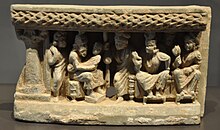Asita
Asita | |
|---|---|
 The prophecy of the seer Asita, slate relief from Gandhara, 3rd/4th century AD (Rietberg Museum, Zurich; Inv. No. RVI 11) | |
| Personal | |
| Religion | Buddhism |
Asita or Kaladevala or Kanhasiri was a
The name Asita literally means 'not clinging' while Kanhasiri means 'dark splendour'.[citation needed] Asita is described as a tāpasa, a practitioner of asceticism.[2]
Biography
The
A vision alerted Asita of the birth of the
Names and Related Figures
Asita was known under several alternate names or nicknames, and Buddhaghosa attributed his name to his dark complexion.[2] He was known as Kanha Devala, Kanha Siri or Siri Kanha, and Kāla Devala.
Another sage or rishi known as Asita Devala is sometimes confused with him in literary sources- this second Asita Devala was a sage from ancient times who was reborn as a disciple of the Buddha.[2] This confusion may explain why in the Lalitavistara Sūtra there are two versions of Asita's prophecy- one where Asita visits Suddhodana as described in the Pali sources, and another where Asita is a hermit living in the Himalayas who never meets Suddhodana but perceives the birth of the Buddha due to his supernatural powers.[2]
The
Early Western scholars related Asita to Simeon, who blessed Jesus as an infant.[2]
